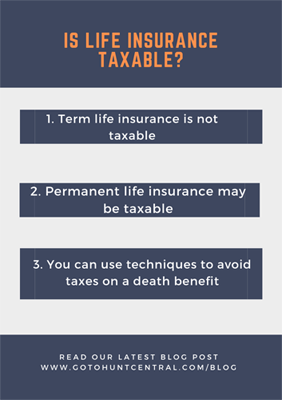Life insurance can replace some of your income, pay debts, and take care of your beneficiaries’ expenses. But is life insurance taxable?
Is Life Insurance Taxable?
Generally, your life insurance death benefit is not taxable. Your beneficiary will receive a tax-free sum. But if you do not have term life insurance, there are exceptions.
When Is Life Insurance Taxable?

Life insurance is taxable in specific situations related to permanent life insurance, which includes whole life, universal life, and variable life policies. Term life insurance, however, guarantees a payout, and no taxes are involved.
Taxes for permanent life insurance:
- Delayed payout – If you add a clause in your policy for the insurer to hold the death benefit before releasing it to the beneficiary, interest will accrue. And your beneficiary must pay taxes on the interest. Or, if your beneficiary asks the insurer to hold the fund temporarily, taxes are due on the interest income.
- Incremental payout – When the full death benefit is paid in installments (e.g., monthly) until the funds are exhausted, your beneficiary will not owe taxes. But you may be taxed on the interest gained as the policy ages.
- Cash value life insurance
- Outstanding loans against a cash value policy are taxable. If you don’t pay back the loan before you die, the balance is subtracted from the death benefit.
- If you surrender a policy for cash and make a profit, the profit is taxable.
- Withdrawals greater than what you paid into the policy are taxable.
- Sell a policy – If you sell the policy’s rights to a third party and make a profit, the profit is taxable.
- Group life insurance – If you receive group life insurance from your employer, the amount above $50,000 is considered taxable income. And the death benefit is taxable.
- Inheritance tax – If you name your estate as your life insurance beneficiary and live in a state with an inheritance tax, the death benefit might be taxable. Retirement accounts, savings, your home, and other assets increase the value of your estate. If your estate’s value exceeds the tax threshold, the death benefit may be taxed.
How to Avoid Taxes on Life Insurance
If the value of your estate is significant, you can avoid taxes on life insurance:
- Don’t name your estate as beneficiary.
- If your estate’s value exceeds $11.58 million (as of 2020), transfer policy ownership to another person. Visit the Estate Tax page on the Internal Revenue website for details.
- Create an irrevocable life insurance trust if you want to maintain control of the policy but not be the legal owner.
Note: If you die within three years of transferring ownership of a life insurance policy, the full death benefit is automatically included in the value of your estate.
Professional Advice on Life Insurance Taxes
Hunt Insurance of Raleigh, NC, offers free consultations and professional guidance to help you find a life insurance policy that is right for you. Call, text, or submit our contact form to request a free consultation.
